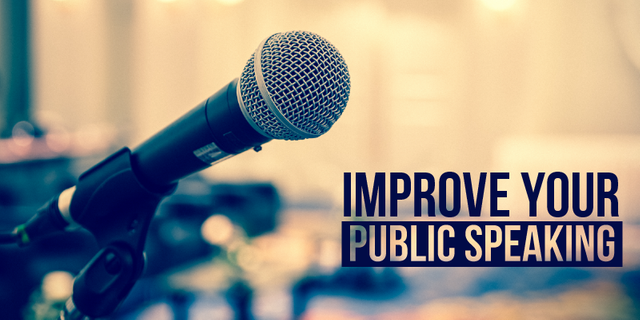10 Steps to Public Speaking Like a Pro

Glossophobia
Many people are terrified of public speaking, some love it, and some even have a phobia of it! When I say "some have a phobia," I mean 75% of people have Glossophobia. Glossophobia is the phobia of public speaking, that mean's if you are afraid so is the majority of the world!
The Most Important Skill
The skill of public speaking is the most valuable skill a person can have at hand. Public speaking can be used to benefit you in every instance in life; it can get you out of an argument with your wife or husband, or even get you your dream job. One thing is for sure, those who can speak can succeed and surpass those who cannot.
So, what if I am terrified of public speaking, does that mean I will equate to nothing and just be another number in the statistics? Let me answer that for you; you are going to be fine! Public speaking can be learned, and like all fears, it can be coped with and improved.
Achievements
I will share a personal story with you all; I too was petrified of speaking publically. Now, I am pretty good! Just a few examples of what I have accomplished because of these ten tips.
I have come 3rd place in the North American Speech competition with only 4 hours to prepare while other had months.
I gave motivational speeches across a few states in America to troubled youth and Canadian provinces.
Ended up giving weekly lectures for a month for local organizations.
Speaking is not even my profession nor am I famous; it is just a skill I got better at by following these steps. Now let's move on to my difficult experience speaking for the first time in front of my classmates. This incident changed my whole life!


The story
It was the year of 2008; I was in grade 8, possibly 12 or 13 years old. My teacher assigned us a presentation to complete on a book we read, the book my teacher assigned me was White Fang by Jack London. First of all, let's get this out of the way, I did not even read the book! I just went online and read a 1-page summary of it and remade a scene from the book in clay inside a shoe box for the presentation.
Long story short, I went up to the front to present and speak with my shoe box clay scene. I looked at my classmates and just said: "My book was White Fang." I just burst out crying; my knees were shaking, my teacher was confused the class was shocked. The teacher gave me a 5-minute break to recollect my self and go back up. The second time I went back up I did the same thing! I cried again for the second time in front of everyone; it was so bad no one mentioned it after class, we all pretended nothing happened!


The 10 Keys to Public Speaking
That moment was so traumatizing I realized that nothing could be worse than that experience. So, I began to speak with out caring and was never afraid again, because I knew it could not get worse. Eventually, I found out about these ten golden keys to success in public speaking. These ten steps transformed the way I spoke forever.
[1] - Passion
Passion is the most vital step to public speaking. If you hate the subject and have no interest in it, you will never speak in a manner that captivates others.
Let me ask you a question, can you talk with a friend about how much you love math for 5 hours? If you hate it like me, the answer is "NO!". If you hate the topic, you will never be able to speak on it.
Here is another example, when ever there is a protest for equal gender rights or politics, the most introverted person will become the greatest speaker in the world. Those who have passion behind what they are speaking about can talk for hours upon hours with the same level of energy and never tire.
You need the same burning passion for the topic you speak about publicly. I have seen the quietest guy in my class in college talk loudly and passionately about anime because he loves it.
A perfect example of passion is Gary Vaynerchuck minus the cussing:
[2] - Gestures
Using gestures while speaking can come naturally, or as always can be learned as well. Gestures usually tend to break out when someone is extremely passionate about a topic. You see people flailing their arms and hands while screaming at their cheating ex.
Like all things, there's a right way and a wrong way to do it. For gestures, there are three main points:
Speak with your palms out towards the audience; this signals trust, openness, and intimacy.
Never point with one finger, point with your whole hand. Pointing with your entire hand gives an expression of importance.
Never slap the back of your hand onto your palm, this gives a sign of threat and is uncomforting.
There are hundreds of different tips for gestures; these are the three I keep in mind. Remeber keep it natural; it becomes apparent when someone has rehearsed it. Gestures reflect your inner feelings and thoughts, so use them accordingly.
Eric Thomas is a prime example of hand gestures, he nails the palm slaps and makes it useful:
[3] - The Voice
Your voice is important when you speak; everyone can tell if you are nervous because your voice shakes and becomes weakened. Keep composed, control your breathing and this helps with combating the dreaded dry throat during a speech. I always need water while speaking; it is my biggest weakness. In general, it is fine to have water on the side while giving a speech, you can pass by with coffee or tea too, but no sodas or alcohol!
Something that comes with the voice that is very important too is the accent. Your accent can be changed and fixed too; I can address this because of my immigrant parents. Taking enunciation classes is vital for those who are native English speakers as well. Knowing how to pronounce a word or letter correctly in the appropriate fashion is integral so that others can comprehend your speech.
I know some of you are thinking it is impossible, I am cursed not being able to speak properly! Do not fret because that thick accent can be cracked and mended back together, so it sounds good. Some great speakers had accents and still did amazing, for example, Mahatma Gandhi.
Many attribute Tony Robbins success to his incredible deep and loud voice, watch this:
[4] - Frequency
While speaking to an audience, you need to figure out who they are and what their background is. You are not going to speak loud and energized at a funeral, or softly at a UFC fight being a commentator. You need to understand what frequency you need to talk at, screaming at elementary students for motivation is not going to work, but it will work for inmates at the penitentiary.
To know how to speak it takes research in knowing who your audience is, if you can not find out at all then you need to make that choice while in front of everyone in a split second. The skill to do it in a split second takes practice by giving more speeches.
Watch how Marc speaks to young students and brings them to tears even though they cannot relate to his experience but he is a good example to make people understand:
[5] - Vocabulary
Vocabulary ties in with who your audience is, if they are children then do not use complicated words and terminologies they can not understand. Vice versa, if you are speaking to Ph.D. students do not use simple words it will bore them to death.
Similar to giving life examples or stories with the audience, It is hard to comprehend an example that you have never experienced. An example for that is; a business man is talking about the frustrations of clients not listening to the sales pitch, while he is giving a speech to doctors. The doctors cannot connect to that example because they never experienced it. The famous Pod Caster and UFC commentator Joe Rogan stopped giving talks at Colleges because they lack the life experiences to understand his speeches.
Here Mark Zuckerberg giving his graduation speech from Harvard in front of high caliber professors, he does not usually speak like this, so he catered to the audience:
[6] - Knowledge
Having much knowledge on the topic can save your life during a speech. Many people experience a "brain fart," when you blank out and forget your whole speech. When you have knowledge on the topic, this enables you to recover quicker in a fashion that no one will know. If you blank out but know a lot, you can start talking about other stuff while trying to recollect. The more you know, the less likely you are to blank out.
Elon Musk is a perfect example of knowing so much that you can keep talking forever:
[7] - Speaking Naturally
I hate sitting for a talk and the person speaking is trying so hard to be this persona that they are not. It feels orchestrated and gets cringy hearing a person cracking unfunny jokes that just end up being offensive.
Everyone has this tone of voice they use while public speaking, I call it the "Speech voice." Once I hear the speech voice I go into standby mode in my brain, and every word just hits my ears and bounces back, the same applies to the audience they do not like it.
The pros speak in a way that sounds natural and not like a speech being read from a script. Speak to the audience like you are in a conversation; it is fluid and natural. If you pay attention, you will see the audience is listening to the introduction and after the speech is over, because those were the only times the talk was natural.

[8] - Organization
While speaking, you need to make sure your topics are organized in your speech. Speaking is the same as writing keeping it organized helps the reader and listener understand and stay focussed.
Transitioning from one topic to the other, from one story to the other is needed to keep it neat and tidy. If you are jumping from topic to the topic, everyone will be confused, and no one will understand what you are trying to get across.

[9] - Practice
Practicing a speech will help you tremendously, it gives you confidence and readiness. The best method of practicing might sound nuts to you, but it works trust me!
Go in front of a mirror and give the speech to your reflection, this will prepare you for two things.
#1. You develop eye contact with the audience, so keeps staring at your reflection!
#2. You gain confidence, and it feels like you are speaking to an audience even though it is just you. Trust me; you will get shy even in front of your reflection.
Abraham Lincoln mentioned he would do this little practice before all of his speeches!
[10] - Do not Memorize the Speech
This is the final key to speaking, do not memorize the speech. When it is memorized and memorized by a beginner, it sounds robotic and not natural. Once people realize it is memorized, they will stop listening.
The best practice is to remember key points and topics when you learn these key points and themes you can elaborate on them on your own after. This gives you room to go off speech because when you memorize the talk and if you miss one part it throws you off completely. The recovery from forgetting a portion of the speech will ruin the whole talk, and you will be embarrassed.
DO NOT END UP LIKE HER!

There we have it everyone, the ten keys to public speaking like a pro! I used these and still use them till this day, and you should do it too! Print this article out and read it every day to your self and implement them one by one until it is second nature.
Nothing is impossible; everything can be done with practice, perseverance, and passion.
If you enjoyed this post, give it a resteem so other can benefit as well, and help me out with a upvote and a follow! Comment below your experiences in public speaking!

This post recieved an upvote from minnowpond. If you would like to recieve upvotes from minnowpond on all your posts, simply FOLLOW @minnowpond
Voice has everything do with breath. If you fix your breath you fix your voice.
There are people that can teach you that and it works like a charm.
Exactly, even the breathing helps with clearly of speaking too.
This post was resteemed by @resteembot!
Good Luck!
Learn more about the @resteembot project in the introduction post.
Also - check out @reblogger, by reading this post.
Check out the other content resteemed by @resteembot.
Some of it is really cool!
This post recieved an upvote from minnowpond. If you would like to recieve upvotes from minnowpond on all your posts, simply FOLLOW @minnowpond
I have phobia for public speaking,it scares the hell out of me
I will give this a try.
I was the vicepresident of my department in a technology,i do the writting while the president speaks
I was lucky he lives speaking
Even appreciation speech scares me
Hopefully, these tips can help you! My first presentation made me cry ahaha!
I think this post is meant for me cus am really shy to speak to a whole lot of people, buh anyways , i'll try your methods, might help... Tanks for the tip anyway
Im happy your able to connect to the post! The tips will help a lot :)
Surprisingly good info! Better than the usual step-by-step instructions.
Thank you! I appreciate the feed back.